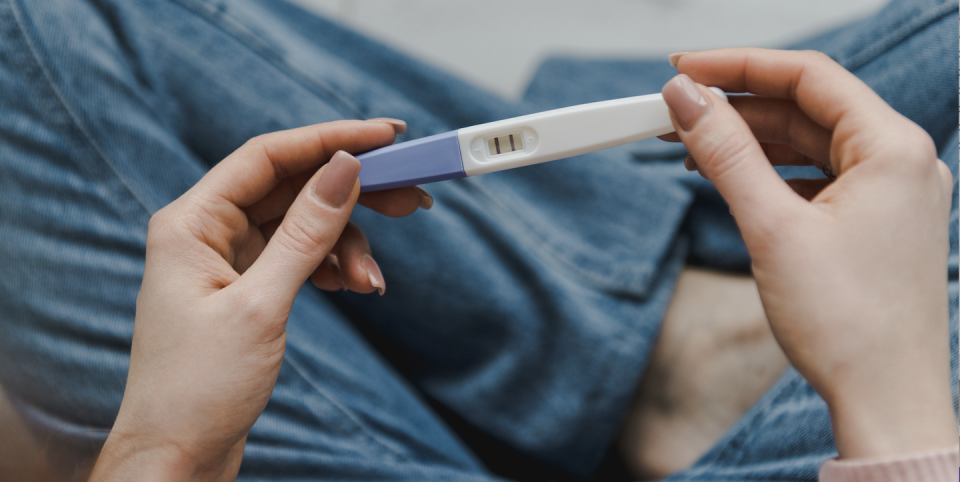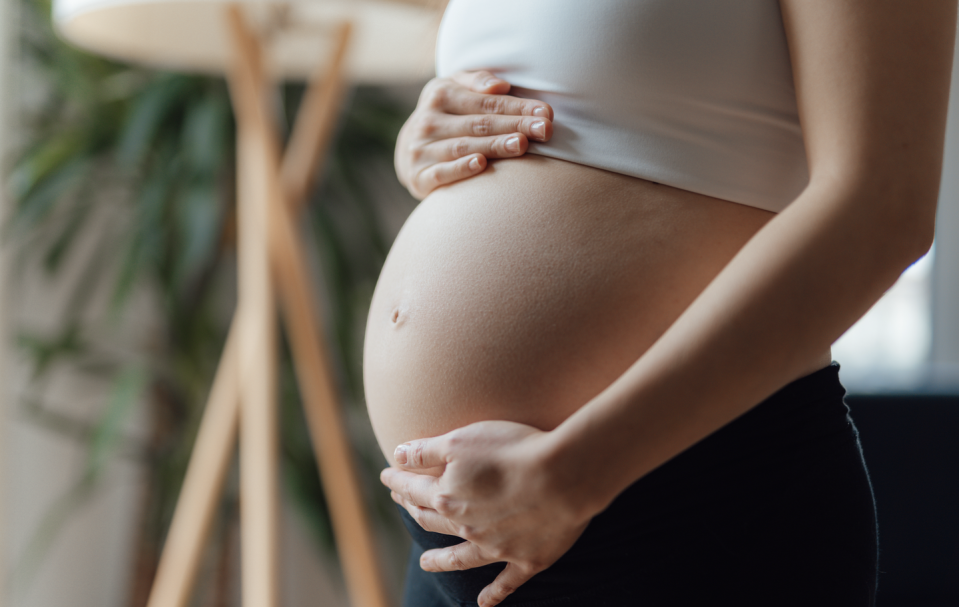This is how long it takes to get pregnant, according to experts

"Don't have sex, because you WILL get pregnant" – it's that Mean Girls quote that we still hear echoing in our heads from what could quite possibly be the worst sex education class of all time. We've all been there, as teenagers, sat in a classroom with a teacher awkwardly mumbling about the importance of using contraception. The "prevent pregnancy" message is one consistently fed to young people at school: if you have unprotected sex, pregnancy is automatically the outcome (and that's before we get onto the whole STI chat).
Fast forward a few years and the same message doesn't always apply. As we age, and potentially find the person we want to start a family with, will we really find it as easy to conceive as we were led to believe in our sex-ed lessons all those years ago? We spoke with Dr Haleema Sheikh, a specialist in integrative women's health and bioidentical hormone balancing, as well as Dr Fiona MacRae from the Marion Gluck Clinic, to find out more.
What are the chances of getting pregnant?
According to the NHS, one in seven couples will experience fertility difficulties. Then there are the people who get pregnant almost immediately, or by accident. It can be frustrating - and naturally, it's different for everyone.
Dr MacRae explains: "The estimated that the chance of becoming pregnant through random unprotected intercourse is around 1 in 20, or 5%, whilst intercourse around ovulation may result in a 25% chance of conception."
Dr Sheikh adds: "The time it takes to get pregnant can vary greatly from person to person, and it depends on a variety of factors, including age, overall health, frequency of intercourse, and reproductive health."
She explains that, on average, around 84% of couples actively trying to conceive in the UK will become pregnant within one year. "After two years of trying, about 50% of those couples who have not conceived within the first year will do so," she adds.

How often should you be having sex when trying to conceive?
"There isn't a one-size-fits-all answer to how often people should be having sex," says Dr Sheikh. She suggests that for most couples, having sex every 2–3 days during the menstrual cycle will cover the fertile window effectively.
You're most likely to get pregnant if you have sex within a day or so of ovulation, which is roughly two weeks after the first day of your last period – Dr Sheikh advises using ovulation predictor tests to help identify your fertile window. "This approach ensures that sperm, which can survive for up to seven days, are present in the reproductive tract whenever ovulation occurs. The egg is viable for fertilisation by a sperm for up to 12–24 hours after it has been released from the ovary before it dies," she adds.
But naturally, when it comes to conceiving, the busier your bedroom, the better.
"The highest pregnancy rates occur in couples having sex daily or every other day," Dr MacRae says. "If this is not practical, then having sex a few times around the time of ovulation maximises the chances of becoming pregnant."
What can affect your chances of getting pregnant?
"Several factors can impact a person's chances of becoming pregnant. These factors can be broadly categorised into biological, lifestyle, and medical. It is important to keep in mind that individual experiences can vary greatly, and not everyone will be affected by these factors in the same way," says Dr Sheikh. These include:
1. Age
"Fertility tends to decline as a person gets older. Women have a limited number of eggs, and the quality of eggs may decrease with age, making it harder to conceive," says Dr Sheikh, who also explains that age-related fertility issues can happen for men, too: "Men also experience a decline in sperm quality and quantity as they age. Low sperm count, poor sperm motility and abnormal sperm morphology can also affect the ability to conceive. Sperm are highly susceptible to damage from oxidative stress, when there is an imbalance of antioxidants to free radicals leading to inflammation and damage."
"Fertility naturally declines with age, as does ovarian function," Dr MacRae agrees. "This may be related to failure to ovulate every cycle or to poor quality eggs and/or hormonal imbalances."
2. Health conditions
Medical conditions, including diabetes and thyroid disorders can affect fertility, explains Dr Sheikh, while polycystic ovaries (PCOS) can lead to irregular ovulation and make it harder to conceive.
"Being underweight may alter the natural cycle and cause lack of ovulation," explains Dr MacNae. "High blood pressure may change the shape of sperm and reduce the chances of conception. Cancer treatments such as chemotherapy and radiotherapy may lead to infertility in both men and women."
For the most part, Dr Sheikh adds, having a healthy and balanced lifestyle can serve as an antidote to fertility issues. "However, lifestyle changes with nutrition, movement, sleep and relaxation can improve outcomes significantly," she says. "They help improve the insulin resistance which is underling the hormonal imbalance in PCOS and can restore regular cycles and ovulation. Optimising sugar levels and ensuring balanced thyroid hormone levels will also improve the chance of becoming pregnant," she adds.
4. Lifestyle factors
Everything from your weight to smoking, consuming alcohol and even stress can impact levels of fertility, says Dr Sheikh. "When women have a low body mass index, the body will shut off the menstrual cycle to protect them from getting pregnant. Conversely, being overweight also impacts fertility as adipose tissue (fat stores) are metabolically active and produce hormones such as oestrogen, which can disrupt the menstrual cycle," she explains.
Sexual health can also be a factor: "Sexually transmitted infections like chlamydia can lead to pelvic inflammatory disease, which can cause scarring in the fallopian tubes, affecting fertility," says Dr Sheikh. "Improving the pillars of health – nutrition, movement, sleep, and relaxation is conducive to creating an internal environment in which our hormones are balanced and signals to the body that it is a 'good' milieu to procreate."
5. Using hormonal contraception
Most people take birth control to do, well, just that: prevent pregnancy. However, even after coming off the hormones, contraceptive methods can have a lasting effect on the body, explains Dr Sheikh. "It is useful to be aware that [hormonal contraception] can cause depletion of a variety of important nutrients, including B vitamins, magnesium, zinc, selenium and antioxidants such as vitamin C and E," she says. "This nutrient depletion can be improved by eating a nutrient dense, minimally processed diet and taking a quality broad spectrum multivitamin/mineral support whilst on the pill and when preparing to conceive."
However, the results of trying to conceive after coming off hormones is variable, explains Dr MacNae. "Some will fall pregnant within months of stopping the pill, whilst others may take several months or even require a fertility intervention to kick start normal ovarian function.
6. Environmental factors
"Exposure to certain environmental toxins, chemicals and pollutants can impact fertility in both men and women," says Dr Sheikh. She explains that ways in which you can reduce your exposure to these toxins include opting for organic produce, avoiding fish that contain high levels of mercury (such as tuna, swordfish and marlin), trying not to store food in plastic containers (to decrease your intake of microplastics) and swapping your cleaning, beauty and personal care products for low-tox alternatives. Dr Sheikh recommends using the Environmental Working Group's database to discover such products.
How can trying for a baby affect your mental health?
"Trying to get pregnant can be a stressful time and cause anxiety and pressure. It is valuable to recognise that stress has a physiological response within the body and can lead to raised cortisol (stress hormone) levels, which puts the body into survival mode – an adaptive response, and the body thinks that it is not safe to procreate," says Dr Sheikh.
She suggests practising mindfulness, meditation and breathing exercises, along with yoga and other forms of gentle exercise, to help keep cortisol levels down.
"It is not uncommon for a couple who have been referred for IVF to get pregnant whilst awaiting treatment, which is probably related to the relief of letting go of the pressure each month and knowing that action has been taken," she explains.
Dr Sheikh also stresses the importance of setting realistic expectations while trying to conceive, and understanding the normal time frames that it can take to help alleviate pressure and disappointment. "Educate yourself about fertility, ovulation, and menstrual cycles. This knowledge can be empowering and help you make informed decisions about when to try and increase your chances of conception," she says.
When should you seek professional help in trying to get pregnant?
This all dependent on age and finances, explains Dr MacNae.
"For a young couple, after teo years of regular unprotected sex without conceiving would be the time to seek a professional opinion," she says. "In older women it may be prudent to seek help sooner. It is also worth bearing in mind that, depending on the area, couples may wait between three months and three years to start fertility treatments."
Dr Sheikh agrees. "If you're under 35 and have been trying to conceive for about a year without success, or if you're over 35 and have been trying for six months, it would be appropriate to consider seeking professional input," she says.
"If you are concerned about your fertility or experiencing difficulties conceiving, it's very reasonable to consult with a qualified healthcare provider who can provide personalised advice based on your medical history and current circumstances."
You Might Also Like

 Yahoo Sport
Yahoo Sport 





































